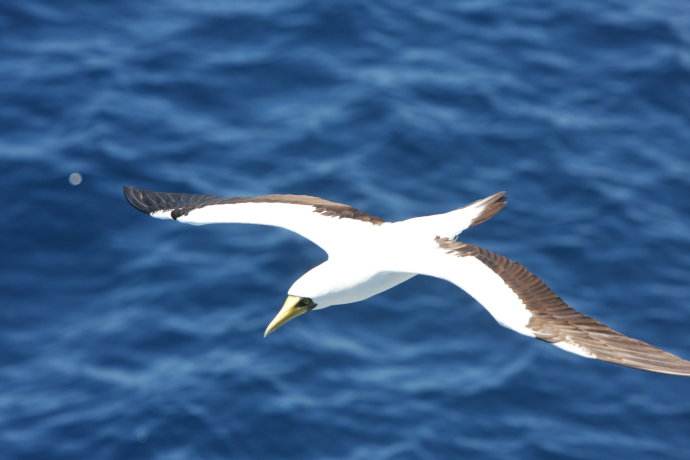Amid the glowing azure of the tropics, at incredible altitudes, almost imperceptible in the dim remoteness,
热带地区的灼热碧空中,在令人难以置信的海拔高度,在昏暗遥远到几乎无法察觉中,
we see him triumphantly sweeping past us—this black, solitary bird, alone in the waste of heaven;
我们能看到它耀武扬威得在我们头顶上一掠而过——这只孤独的黑色大鸟,在无尽的天空中独行;
or, at the most, at a lower elevation, the snow-white sea-swallow crosses his flight in easy grace!
或者,最多在比较低的纬度,雪白的海燕优雅从容地与它交相飞过!

On looking at him closely, you perceive that he has no feet.
一旦你近距离观察它,就会认为它并没有脚。
At all events, his feet, being exceedingly short, can neither walk nor perch.
无论怎样,它的脚的确非常短,既不能走路也不能在树木上栖息。
With a formidable beak, he has not the talons of a true eagle of the sea.
由于已经拥有了可怕的喙,它便不再需要拥有像老鹰那样的利爪在海上猎食了。
Thence arises his life of uncertainty and hazard—the life of a corsair and a pirate rather than of a mariner.
因此,它的生命中充满着不确定性和危险——更像强盗或海盗的生活,而不像是水手的生活。
The immense and superb apparatus of his wings becomes on land a danger and an embarrassment.
它那超大型的宽大的翅膀也是其在陆地上的一个危险和困窘。
To raise himself, he needs a strong wind and a lofty station—a promontory, a rock.
为了便于顺利起飞,它需要强风和高地——海角或一块高耸的石头上。



